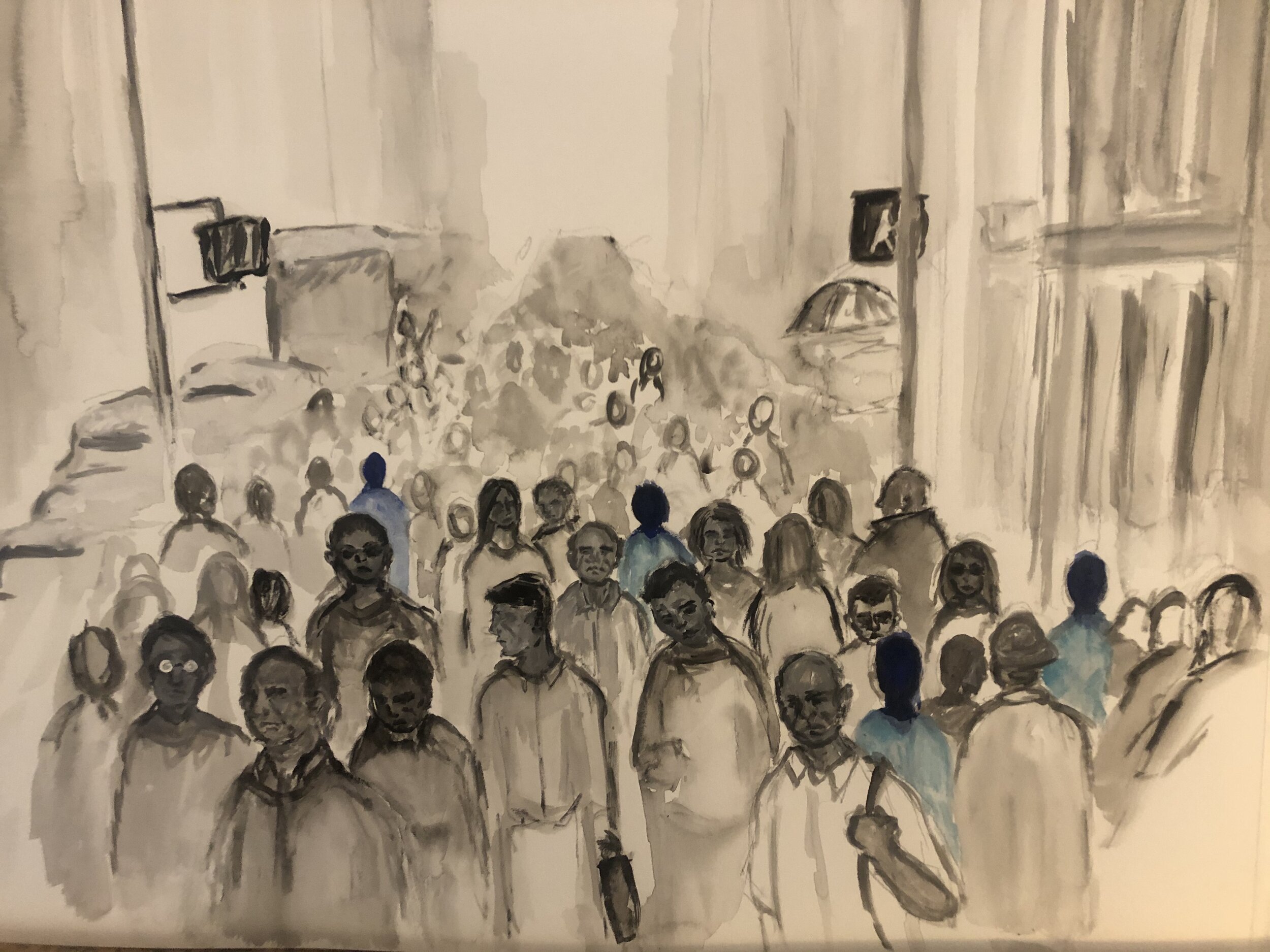The poem titled, “To the Woman at My Mother’s Funeral Who Thought It Was So Lovely that My Mother Died at Home” by Kathryn Paul (Spring 2022 Intima, Poetry), circles around my mind days after reading it. Paul’s poem eloquently speaks back to the assumption that it is always good to die at home, that home deaths are always peaceful. The literal hands-on work of caregiving—the cleaning of blood, mucus, urine and feces — is unspoken and generally done by women, whether paid or unpaid, and the writer, who in her bio calls herself “a survivor of many things” captures this in her poem.
Read moreLeaning Close: "No more interventions. No more transfusions." A reflection on mortality and morbidity rounds by pediatrician-writer Laura Johnsrude
When I read “All Tuned Up” by Albert Howard Carter III (Spring 2021 Intima), I remembered a pediatric intensive care unit patient from my own 1980’s residency experience. In Carter’s poem, a medical resident presents a case during mortality and morbidity rounds. The resident is moved to tears as he tells the gathered audience about the death of a patient he knew well. A senior doctor “gently” offers context and says, “Maybe he was just tired.”
Mercifully, I’ve muffled memories from some of the deaths during my residency training in the pediatric intensive care unit. But I remember a slight girl of about sixteen with silky, wavy hair, lying in a metal-frame bed parallel to the wall against the window, in silhouette.
Read moreThe Individual Nature of Care by Joanne Clarkson
A nurse examines a clinical encounter through her poetry and appreciates the individual nature of care.
Read moreOn Knowing
A nurse ponders the role of hope in the clinical encounter and whether the holy can be found within the realm of medicine.
Read moreThe Reduction of Human Life and Tight Narrative
Writing against the backdrop of her husband’s stay in hospice care, a retired professor examines how the reduction of human life in the midst of suffering can be summarized in succinct narrative.
Read moreWhen Visuals Become Verbal: The Art of Communicating Emotional States of Mind by Barbara West
© Blue Pajama Series - Crowd by Rachel Wyman Fall 2021 Intima
A writer and hospice nurse explores the parallels between one of her essays published in Intima and a studio art series previously published in this journal.
Read moreMothers and Daughters: A Reflection on Cancer, Caring and Seeing the Whole Picture by poet Kathryn Paul
—After ‘Macroscopic” by Adela Wu (Spring 2021 Intima)
My mother and I were not close. I knew she wanted us to be, but I couldn’t do it her way. For most of my adult life, I kept my distance, emotionally and physically. We lived on opposite sides of the continent. In her 80’s, the creeping dementia my mother never discussed was overtaken by a cruel and much more terrifying diagnosis: Stage IV ovarian cancer.
Aided by her cancer-free twin sister, Mom endured multiple surgeries and two lengthy and debilitating rounds of chemo. Each time, her cancer came roaring back within weeks. Her surgeon suggested an experimental Round Three. Mercifully, her oncologist suggested hospice at home instead.
During the first year of Mom’s illness, I was trapped by my own cancer treatment, unable to participate in her care. I called daily, spoke with her, spoke with my aunt, asked about her pain, her “tummy trouble,” her ascites, and her white count. I took notes and dictated the questions to ask at her next appointment.
As soon as my doctors cleared me to visit her, I did. I was always on the verge of moving in with her, but never quite needed to do so. I flew back and forth. The more debilitated she became—by her cancer and her dementia—the more often I visited.
Adela Wu’s Studio Art piece “Macroscopic” simply and eloquently captures the changes in how I experienced my mother during those last months and weeks. The simplest things gave her joy: A small dish of ice cream. A pain-free nap on the down-stuffed cushions of her couch. Cuddles with her cats. A bird visiting the feeder outside her window.
Even as her disease spread through her body, even as she faded, my mom seemed to crystallize. She became, ultimately, the Essence of herself. And—just at the end—I finally saw her.
Kathryn Paul
Photo by Andrew Givhan
Kathryn Paul (Kathy) is a survivor of many things, including cancer and downsizing. Her poems have appeared in Rogue Agent, Hospital Drive, The Ekphrastic Review, Lunch Ticket, Stirring: A Literary Collection, Pictures of Poets and Poets Unite! The LiTFUSE @10 Anthology. Her poem “Dementia Waltz” appears in the Spring 2021 Intima.
This Game We Play Called “Dying." A Meditation About Being on the Sidelines by Vivian Lam
The game of death is quite addictive.
Of course, the stakes are high—it’s the end of all things, the last chance, last glance, last words. All-or-nothing; last-ditch effort. A lifetime of apologies, love, and tenderness condensed into a prognosis of months, days, a few gasping breaths.
Read more


